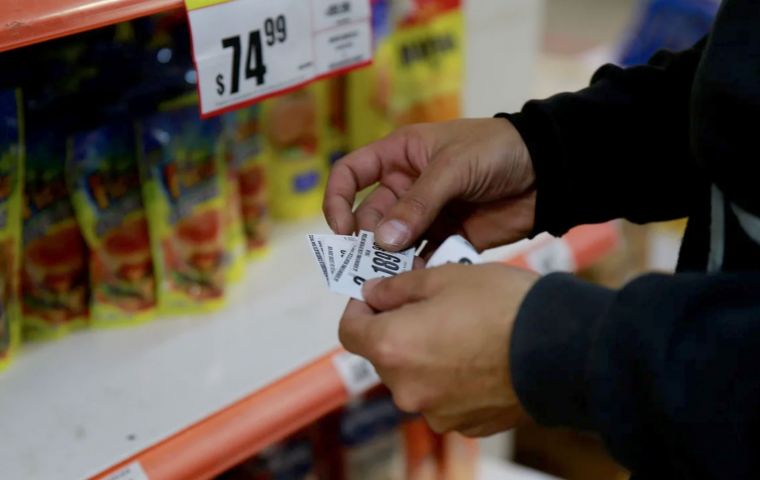MercoPress. South Atlantic News Agency
Argentina's monthly inflation above that of Venezuela in 2022
 Venezuela still is the country with the highest inflation, but Argentina is on its way to toppling it from that dubious pedestal
Venezuela still is the country with the highest inflation, but Argentina is on its way to toppling it from that dubious pedestal Argentina's consumer price index (CPI) for the month of February of 2022 is expected to be around 3.9%, while Venezuela's would be below half that much, at 1.7%, it was reported.
After years of hyperinflation, Venezuela is beginning to see its CPI drop and prices did go up 246% over the past year, while Argentina's yearly inflation was around 55%, depending on the measurement. Still, that trend is beginning to change and Argentina now looks poised to become the number one country in the world with the worst inflation.
In the first two months of 2022, Venezuela has reported a 6.6% increase in prices, while Argentine economists are projecting the local number to be around 7.9%, although the official figures are yet to be released.
Venezuela had announced in December that it had overcome the hyperinflation period after four consecutive months of single-digit inflation after reaching that category in 2017 when a 56.7% inflation was recorded for the last quarter of that year alone. According to Venezuela's Central Bank (BCV), annual inflation back then hit 862.6% and 130,060% the following year. But now the last time Venezuela recorded a monthly variation above 50% was in December 2020. With yoy inflation now below 50%, the situation is considered to be just “high inflation.”
February's 1.7% stems from the Venezuelan Finance Observatory (OVF), an independent body made up of experts alternative to the official one. The BCV index published two days earlier was 2.9%, still below Argentina's projected results. The BCV measured a cumulative 9.79% in the first two months of 2022.
The monthly inflation registered in February by the OVF is the sixth consecutive one-digit inflation, “exclusively by the appreciation of the bolivar against the [US] dollar.”
Venezuela applied in recent years a significant reduction in spending by the State, restrictions on bank credit, and lower spending in bolivars to maintain the stability of the exchange rate. In 2017, the deficit was 20% of GDP.
The Venezuelan Government also decided to end the gasoline subsidy, loosen price controls, and open up the exchange market, which has resulted in the arrival of imported goods. It also facilitated some local manufacturing.
“The BCV's intervention policy during February was reflected in a 3.3 percent drop in the exchange rate. Thus, the BCV lost international reserves in February in the amount of 36 million dollars, despite the high oil prices,” the OVF went on.
Meanwhile, inflation in Argentina shows no signs of slowing down, although Venezuela's place as the economy with the highest inflation in the world is still unchallenged. According to the BCV, 2021 closed with annual inflation of 686.4%, still far from the Argentine records.




Top Comments
Disclaimer & comment rules-

Read all commentsHence the prevailing moniker, “Argenzuela.”
Mar 10th, 2022 - 02:12 am +1Commenting for this story is now closed.
If you have a Facebook account, become a fan and comment on our Facebook Page!